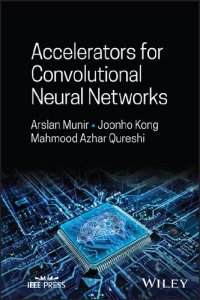
Ebook: Accelerators for Convolutional Neural Networks
Author: Arslan Munir, Joonho Kong, Mahmood Azhar Qureshi
- Genre: Computers // Algorithms and Data Structures: Pattern Recognition
- Year: 2023
- Publisher: Wiley
- Language: English
- pdf
Accelerators for Convolutional Neural Networks
Comprehensive and thorough resource exploring different types of convolutional neural networks and complementary accelerators
Accelerators for Convolutional Neural Networks provides basic deep learning knowledge and instructive content to build up convolutional neural network (CNN) accelerators for the Internet of things (IoT) and edge computing practitioners, elucidating compressive coding for CNNs, presenting a two-step lossless input feature maps compression method, discussing arithmetic coding -based lossless weights compression method and the design of an associated decoding method, describing contemporary sparse CNNs that consider sparsity in both weights and activation maps, and discussing hardware/software co-design and co-scheduling techniques that can lead to better optimization and utilization of the available hardware resources for CNN acceleration.
The first part of the book provides an overview of CNNs along with the composition and parameters of different contemporary CNN models. Later chapters focus on compressive coding for CNNs and the design of dense CNN accelerators. The book also provides directions for future research and development for CNN accelerators.
Other sample topics covered in Accelerators for Convolutional Neural Networks include
How to apply arithmetic coding and decoding with range scaling for lossless weight compression for 5-bit CNN weights to deploy CNNs in extremely resource-constrained systems
State-of-the-art research surrounding dense CNN accelerators, which are mostly based on systolic arrays or parallel multiply-accumulate (MAC) arrays
iMAC dense CNN accelerator, which combines image-to-column (im2col) and general matrix multiplication (GEMM) hardware acceleration
Multi-threaded, low-cost, log-based processing element (PE) core, instances of which are stacked in a spatial grid to engender NeuroMAX dense accelerator
Sparse-PE, a multi-threaded and flexible CNN PE core that exploits sparsity in both weights and activation maps, instances of which can be stacked in a spatial grid for engendering sparse CNN accelerators
For researchers in AI, computer vision, computer architecture, and embedded systems, along with graduate and senior undergraduate students in related programs of study, Accelerators for Convolutional Neural Networks is an essential resource to understanding the many facets of the subject and relevant applications.
Comprehensive and thorough resource exploring different types of convolutional neural networks and complementary accelerators
Accelerators for Convolutional Neural Networks provides basic deep learning knowledge and instructive content to build up convolutional neural network (CNN) accelerators for the Internet of things (IoT) and edge computing practitioners, elucidating compressive coding for CNNs, presenting a two-step lossless input feature maps compression method, discussing arithmetic coding -based lossless weights compression method and the design of an associated decoding method, describing contemporary sparse CNNs that consider sparsity in both weights and activation maps, and discussing hardware/software co-design and co-scheduling techniques that can lead to better optimization and utilization of the available hardware resources for CNN acceleration.
The first part of the book provides an overview of CNNs along with the composition and parameters of different contemporary CNN models. Later chapters focus on compressive coding for CNNs and the design of dense CNN accelerators. The book also provides directions for future research and development for CNN accelerators.
Other sample topics covered in Accelerators for Convolutional Neural Networks include
How to apply arithmetic coding and decoding with range scaling for lossless weight compression for 5-bit CNN weights to deploy CNNs in extremely resource-constrained systems
State-of-the-art research surrounding dense CNN accelerators, which are mostly based on systolic arrays or parallel multiply-accumulate (MAC) arrays
iMAC dense CNN accelerator, which combines image-to-column (im2col) and general matrix multiplication (GEMM) hardware acceleration
Multi-threaded, low-cost, log-based processing element (PE) core, instances of which are stacked in a spatial grid to engender NeuroMAX dense accelerator
Sparse-PE, a multi-threaded and flexible CNN PE core that exploits sparsity in both weights and activation maps, instances of which can be stacked in a spatial grid for engendering sparse CNN accelerators
For researchers in AI, computer vision, computer architecture, and embedded systems, along with graduate and senior undergraduate students in related programs of study, Accelerators for Convolutional Neural Networks is an essential resource to understanding the many facets of the subject and relevant applications.
Download the book Accelerators for Convolutional Neural Networks for free or read online
Continue reading on any device:

Last viewed books
Related books
{related-news}
Comments (0)